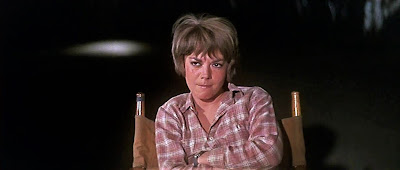It’s Christmas in July! Or, at least that’s how it feels
since I got it in my head this month to read (for the first time!) Charles
Dickens’ A Christmas Carol. An act which,
in turn, brought about my umpteenth revisit to the 1970 big-budget musical flop Scrooge (mercifully, without an exclamation point), my absolute favorite screen adaptation of this
oft-told holiday allegory.
A Christmas Carol and
its tale of a miserly old curmudgeon who finds spiritual redemption through the
intervention of three spectral warnings, has been adapted, reworked and
re-imagined so many times and in so many different formats that reference sources can't even agree on an actual number. I've seen and suffered
through a great many over the years myself, the best of the lot being the
well-regarded 1951 Alastair Sim version; that beloved staple of my childhood, Mr. Magoo’s A Christmas Carol (1962);
and, a particular favorite, 1992’s The
Muppet Christmas Carol. But no adaptation rouses me, touches my heart, or
gets the waterworks flowing for me like Scrooge. I just adore it. It may not be the most faithful Dickens adaptation, or even the best, but like the tree atop the Capitol Records Building in my neighborhood of Hollywood, it never fails to make me feel like it's Christmas. And as such, it's the most thoroughly charming and satisfying of all the versions of A Christmas Carol I've ever seen.
 |
| Albert Finney as Ebenezer Scrooge |
 |
| Alec Guinness as Jacob Marley |
 |
| Dame Edith Evans as The Ghost of Christmas Past |
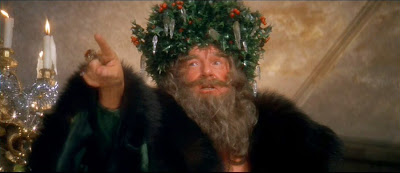 |
| Kenneth More as The Ghost of Christmas Present |
A brief look at the films released in 1970 reveals a kind of battle
being raged at the boxoffice. Old-fashioned, elephantine studio releases like Airport, Tora!Tora!Tora!, and Ryan’s
Daughter were duking it out with smaller, youth-centric films like M*A*S*H, Five Easy Pieces, and Diary of a Mad Housewife. When my friends and I went to the movies on weekends,
it was often a choice between what we called “parents' movies” or “something good,” which usually meant
something pretentious, grounded in “realism,” or with nudity (preferably, all
three).
Old-style Hollywood movies, particularly musicals, were considered "plastic." Something which, in post-'60s vernacular, was appreciably worse than old-fashioned. Plastic meant artificial, contrived, corny, and old-hat. Hollywood, which had grown increasingly out of touch with public tastes in the latter part of that decade, could have saved itself untold headaches (not to mention millions) by heeding the cultural warning signs and not continuing to sink money into pricey dinosaurs like Star! (1968), Hello Dolly (1969), and Paint Your Wagon (1969) long after interest in films of this scope had waned.
An excellent example of how abruptly tastes had changed by 1970
is apparent in the way movie fans that year avoided Barbra Streisand doing what she does
best (singing) in the G-rated On a Clear Day You Can See Forever in favor of seeing her in a more realistic milieu (crassly so, many thought) playing a foul-mouthed, non-singing, New York prostitute in the R-rated and hilarious The Owl & the Pussycat. Even Julie
Andrews, the lady primarily responsible for reviving the musical genre with The Sound of Music, couldn't get fans to
turn out for Darling Lili that same year. Tellingly, the only movie
musicals young people went to see in 1970 were all documentaries: Woodstock,
The Rolling Stones’ Gimme Shelter,
and The Beatles’ Let It Be.
While the story of Ebenezer Scrooge had a pre-sold market familiarity and a royalties-free public domain accessibility, the mounting of a large-scale, wholly British musical production of the material was a hard sell from the start. Albert Finney was known to American audiences for his Academy Award-nominated/Golden Globe-winning performance in Tom Jones (1963), but was nobody's idea of a boxoffice draw. Likewise, director Ronald Neame (The Prime of Miss JeanBrodie, The Poseidon Adventure) was hardly a household name. Screenwriter/composer Leslie Bricusse was seen as something of a drawing card due to his long association with entertainer Anthony Newley, but whatever goodwill he'd built up on the strength of Broadway hits like Stop the World I Want to Get Off (1961) was compromised by being very publicly associated with the double-barreled bombs: Goodbye Mr. Chips (1969) and Doctor Dolittle (1967).
Saddled with feebly-rendered posters and a terrible ad campaign practically designed to scare audiences away (“Scrooge - All Singing! All Dancing! All Heart!”), Scrooge limped into theaters in November of 1970, with its only marketing hooks being the familiarity of Dickens' story and the surprising presence of a handsome 34-year-old leading man cast in the role of the crotchety old miser.
For all the above-stated reasons, I steered clear of Scrooge when it came out. But when it began to make the rounds on TV every Christmas, I regretted never having granted myself the opportunity to see it on the big screen. Even in its heavily-edited* state, it thoroughly delighted and captivated me.
*Perversely, early TV broadcasts eliminated most of the musical number "Thank You Very Much," arguably the most lively and kid-friendly song in Scrooge's lovely but somewhat sluggish score. They also edited out the scenes of Scrooge in hell and some of the scarier stuff involving Marley and the Ghost of Christmas Yet to Come. Ignoring that children's classics like The Wizard of Oz are heavy on both scares and cheerful music, like a death wish, the networks instead zeroed in on Scrooge's warmth...a guaranteed humbug for children's Christmastime viewing. Happily, the DVD has everything restored.
WHAT I LOVE ABOUT THIS FILM
Because the story itself has such a musical rhythm, Leslie Bricusse's score of melodic, undistinguished songs feel perfectly fine without being particularly noteworthy. The songs are pleasant enough, propelling the plot, fleshing out character and motivation, and, when they are at their best, expressing joy. But unlike say, the songs of the Sherman brothers (Mary Poppins, Bedknobs & Broomsticks) whose melodies for Disney movies are so infectious they have almost become nursery rhymes and childhood classics; no matter how often I see Scrooge, I can’t remember a single song afterward except “Thank You Very Much.” On the plus side, the forgettable nature of Bricusse's songs has the effect of making the film feel new to me each time I revisit it.
THE STUFF OF FANTASY
THE STUFF OF DREAMS
Old-style Hollywood movies, particularly musicals, were considered "plastic." Something which, in post-'60s vernacular, was appreciably worse than old-fashioned. Plastic meant artificial, contrived, corny, and old-hat. Hollywood, which had grown increasingly out of touch with public tastes in the latter part of that decade, could have saved itself untold headaches (not to mention millions) by heeding the cultural warning signs and not continuing to sink money into pricey dinosaurs like Star! (1968), Hello Dolly (1969), and Paint Your Wagon (1969) long after interest in films of this scope had waned.
 |
| Dancing on His Grave The townsfolk celebrate Scrooge's demise in the exuberant (and Best Song Oscar-nominated) "Thank You Very Much," a number owing a considerable debt to Oliver!'s "Consider Yourself" |
 |
| The Ghost of Hollywood Yet to Come By the '70s, big studio productions like Scrooge were already a dying breed. |
While the story of Ebenezer Scrooge had a pre-sold market familiarity and a royalties-free public domain accessibility, the mounting of a large-scale, wholly British musical production of the material was a hard sell from the start. Albert Finney was known to American audiences for his Academy Award-nominated/Golden Globe-winning performance in Tom Jones (1963), but was nobody's idea of a boxoffice draw. Likewise, director Ronald Neame (The Prime of Miss JeanBrodie, The Poseidon Adventure) was hardly a household name. Screenwriter/composer Leslie Bricusse was seen as something of a drawing card due to his long association with entertainer Anthony Newley, but whatever goodwill he'd built up on the strength of Broadway hits like Stop the World I Want to Get Off (1961) was compromised by being very publicly associated with the double-barreled bombs: Goodbye Mr. Chips (1969) and Doctor Dolittle (1967).
Saddled with feebly-rendered posters and a terrible ad campaign practically designed to scare audiences away (“Scrooge - All Singing! All Dancing! All Heart!”), Scrooge limped into theaters in November of 1970, with its only marketing hooks being the familiarity of Dickens' story and the surprising presence of a handsome 34-year-old leading man cast in the role of the crotchety old miser.
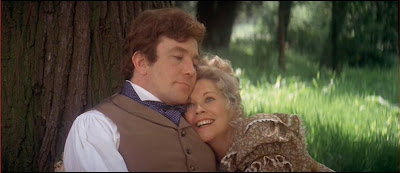 |
| Albert Finney as young Ebenezer, Suzanne Neve as Isabel Fezziwig, the love he let get away |
For all the above-stated reasons, I steered clear of Scrooge when it came out. But when it began to make the rounds on TV every Christmas, I regretted never having granted myself the opportunity to see it on the big screen. Even in its heavily-edited* state, it thoroughly delighted and captivated me.
*Perversely, early TV broadcasts eliminated most of the musical number "Thank You Very Much," arguably the most lively and kid-friendly song in Scrooge's lovely but somewhat sluggish score. They also edited out the scenes of Scrooge in hell and some of the scarier stuff involving Marley and the Ghost of Christmas Yet to Come. Ignoring that children's classics like The Wizard of Oz are heavy on both scares and cheerful music, like a death wish, the networks instead zeroed in on Scrooge's warmth...a guaranteed humbug for children's Christmastime viewing. Happily, the DVD has everything restored.
 |
| Banished to Hell, Scrooge is shown the ropes (or, in this case, chains) by his old friend, Jacob Marley |
WHAT I LOVE ABOUT THIS FILM
I do not mean to sell Scrooge short, but I'd be less than honest if, in praising this well-acted and wholly pleasing adaptation, I fail to mention that I'm a bit of a soft touch when it comes to A Christmas Carol as a story. There is just
something I find so elementally moving in the hopeful theme of personal transformation, the retrieval of the lost soul, and the warming of a frozen heart. The idea that all people, no matter how deeply mired in the selfish and superficial, have within them the potential for positive change has always been one of my narrative pet weaknesses. It
just rips me up. It would be a poor adaptation of A
Christmas Carol, indeed, that doesn't have me in tears by the time Ebenezer begins to see the error of his ways. Scrooge does
this job exceptionally well, and by the film’s last 10 minutes I’m fairly a mess.
 |
| Albert Finney won a Best Actor Golden Globe for Scrooge. He would sing onscreen again as Daddy Warbucks in 1982's Annie |
There’s something about the fairy-tale quality of Dickens’
writing - present in A Christmas Carol in
particular - which lends itself to easy transfer to a musical format. The characters have great, Seussical names like Fezziwig and Cratchit (and, of course, the onomatopoeic perfection that is Ebenezer Scrooge…which is, like, the best name EVER!), and the broad emotions of Scrooge’s reality are, almost like musical counterpoint to the melancholy tenderness of the story's sentimentality. When the two contrasting worlds mesh during the last act, it feels like a musical crescendo.
Because the story itself has such a musical rhythm, Leslie Bricusse's score of melodic, undistinguished songs feel perfectly fine without being particularly noteworthy. The songs are pleasant enough, propelling the plot, fleshing out character and motivation, and, when they are at their best, expressing joy. But unlike say, the songs of the Sherman brothers (Mary Poppins, Bedknobs & Broomsticks) whose melodies for Disney movies are so infectious they have almost become nursery rhymes and childhood classics; no matter how often I see Scrooge, I can’t remember a single song afterward except “Thank You Very Much.” On the plus side, the forgettable nature of Bricusse's songs has the effect of making the film feel new to me each time I revisit it.
Where Scrooge surpasses
so many other versions of A Christmas
Carol for me is in the pleasure I derive from Albert Finney’s bilious take on Ebenezer Scrooge. He’s a
great deal of fun as a devoted killjoy, barking insults at people and shoving
children out of his path. So much so that one is likely to be reluctant to see
him rehabilitated too soon. As should come as no surprise to anyone who’s seen his Hercule
Poirot in Murder on the Orient Express,
Finney is a movie star with the heart of a character actor. Concealing makeup and
prosthetics that would swallow up lesser actors only seem to liberate the versatile British actor from the limitations imposed by his "leading man" good looks.
As Scrooge, Finney’s transformation is mostly body language, and he plays Ebenezer as a sad, disappointed man who has steeled himself from pain by stiffening and gnarling his entire countenance into a knot of meanness.
As Scrooge, Finney’s transformation is mostly body language, and he plays Ebenezer as a sad, disappointed man who has steeled himself from pain by stiffening and gnarling his entire countenance into a knot of meanness.
.JPG) |
| Scrooge contemplates his younger self |
THE STUFF OF FANTASY
I have no idea what that shooting budget for Scrooge was, but the film looks great in that old-fashioned, shot-entirely-in-a-studio way that triggers a certain nostalgia. The scope of the film isn't as grandiose as its spiritual cousin Oliver!, but Scrooge boasts a distinguished cast of British actors, pleasing period detail in costumes and sets, and the overall look of it is finely turned-out and sumptuous. The special effects, which must have been pretty dazzling in 1970, are pretty primitive by today's standards, but rendered all the more charming by that fact (God, am I tired of CGI). Also, I think most of the cast, if not all, does its own singing!
 |
| A Page Out of Dickens Bob Cratchit with son Tiny Tim (Richard Beaumont) and daughter, Kathy (Karen Scargill) |
THE STUFF OF DREAMS
Christmas is my favorite holiday season. And living here in L.A., its a beautiful time where the city of glitter and glitz puts on an extra layer of tinsel that makes a simple walk down the street feel like you're starring in your own MGM musical. It's not my usual habit to watch holiday movies in the swelter of summer, but in this case, I had such a blast (and a REALLY good cry) revisiting the world of Charles Dickens. Dickens by way of a delightful musical film that just happened to have been released when delightful musical films were no longer on America's agenda of moviegoing prerequisites. If Scrooge isn't already considered a holiday classic, it should be. It stands as an excellent reminder that just because a film is out of step with the times in which it was made, doesn't necessarily mean that it's a film out of step.
 |
| "God bless Us, Every One!" |
Copyright © Ken Anderson 2009 - 2013





.JPG)







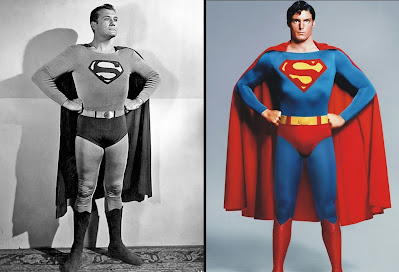












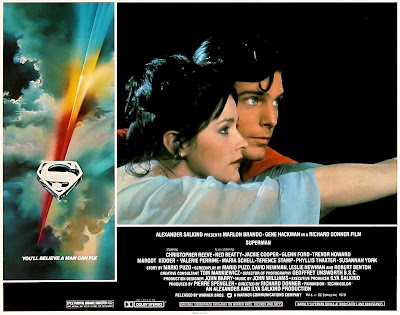



.JPG)
.JPG)






